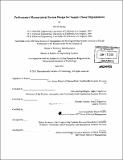| dc.contributor.advisor | Deborah Nightingale and Ricardo Valerdi. | en_US |
| dc.contributor.author | Hwang, David Delchi, 1975- | en_US |
| dc.contributor.other | Leaders for Global Operations Program. | en_US |
| dc.date.accessioned | 2011-09-27T18:40:09Z | |
| dc.date.available | 2011-09-27T18:40:09Z | |
| dc.date.copyright | 2011 | en_US |
| dc.date.issued | 2011 | en_US |
| dc.identifier.uri | http://hdl.handle.net/1721.1/66076 | |
| dc.description | Thesis (M.B.A.)--Massachusetts Institute of Technology, Sloan School of Management; and, (S.M.)--Massachusetts Institute of Technology, Engineering Systems Division; in conjunction with the Leaders for Global Operations Program at MIT, 2011. | en_US |
| dc.description | Cataloged from PDF version of thesis. | en_US |
| dc.description | Includes bibliographical references (p. 86-89). | en_US |
| dc.description.abstract | This thesis proposes a methodology to create an effective performance measurement system for an interconnected organization. The performance measurement system is composed of three components: a metrics set, a metrics review business process, and a dashboard visualization technique to display the data. If designed according to the proposed methodology, the combination of these three elements produces a performance measurement system which drives behavior, creates accountability, and fosters continuous organizational improvement. The proposed methodology has been demonstrated by its application to a supply planning organization within a major technology manufacturing company. Specifically, the performance measurement system of this supply planning organization was redesigned using the proposed methodology and pilot-tested over the course of a six-month period. First, the metrics set was redesigned based on alignment to strategic objectives and grounded in metrics design fundamentals. Second, the business process to review the organization's metrics and spur action was streamlined and redesigned for maximum impact and engagement. Finally, a visualization dashboard was created to communicate key metrics clearly to all members of the organization. The resulting performance measurement system demonstrates the effectiveness of the proposed methodology and has been adopted as the system-on-record for the organization. Broadly speaking, the principles of performance measurement design provided in this thesis can be applied to other interconnected organizations. | en_US |
| dc.description.statementofresponsibility | by David Hwang. | en_US |
| dc.format.extent | 89 p. | en_US |
| dc.language.iso | eng | en_US |
| dc.publisher | Massachusetts Institute of Technology | en_US |
| dc.rights | M.I.T. theses are protected by
copyright. They may be viewed from this source for any purpose, but
reproduction or distribution in any format is prohibited without written
permission. See provided URL for inquiries about permission. | en_US |
| dc.rights.uri | http://dspace.mit.edu/handle/1721.1/7582 | en_US |
| dc.subject | Sloan School of Management. | en_US |
| dc.subject | Engineering Systems Division. | en_US |
| dc.subject | Leaders for Global Operations Program. | en_US |
| dc.title | Performance measurement system design for supply chain organizations | en_US |
| dc.type | Thesis | en_US |
| dc.description.degree | S.M. | en_US |
| dc.description.degree | M.B.A. | en_US |
| dc.contributor.department | Leaders for Global Operations Program at MIT | en_US |
| dc.contributor.department | Massachusetts Institute of Technology. Engineering Systems Division | |
| dc.contributor.department | Sloan School of Management | |
| dc.identifier.oclc | 753711371 | en_US |
